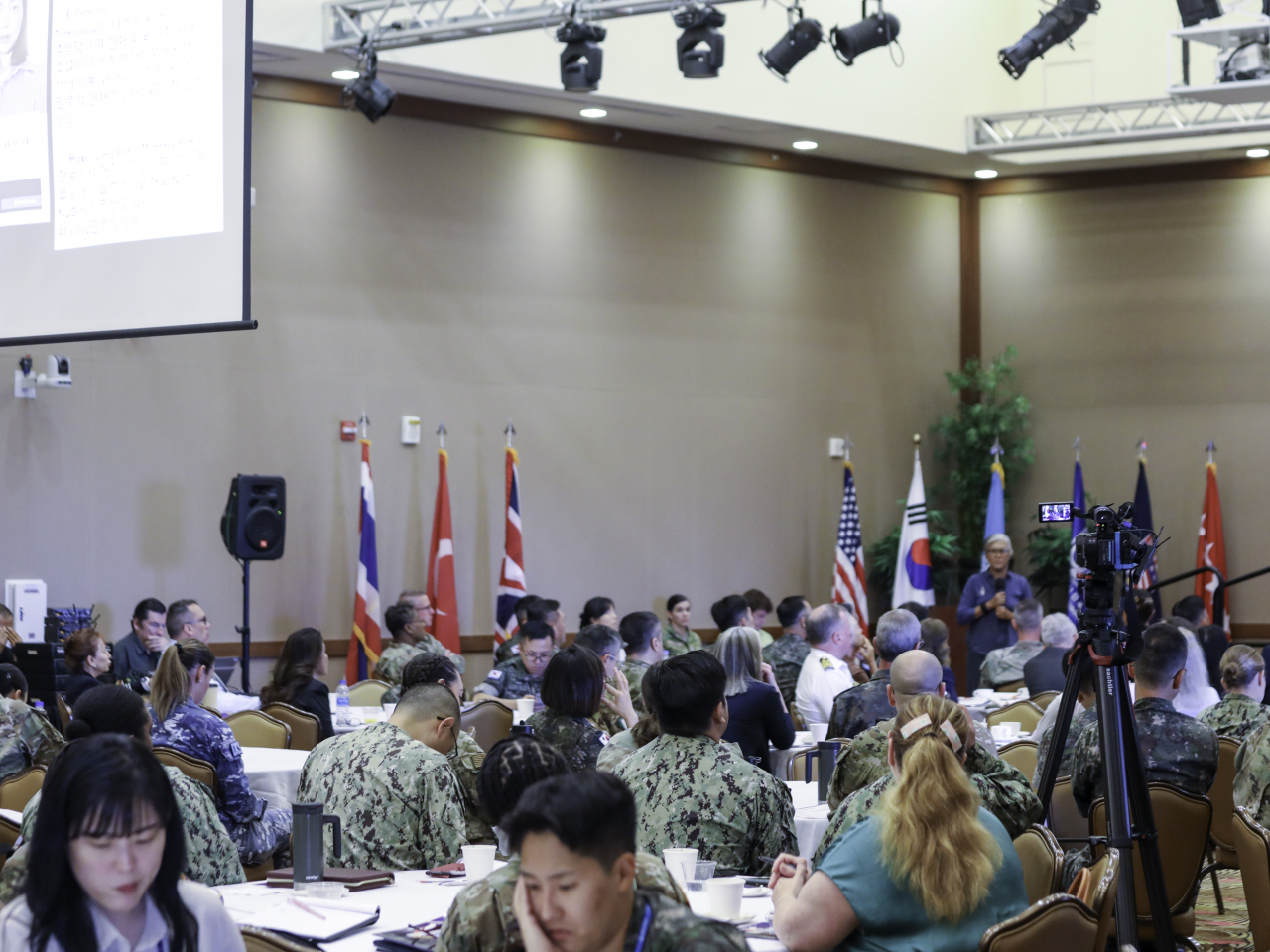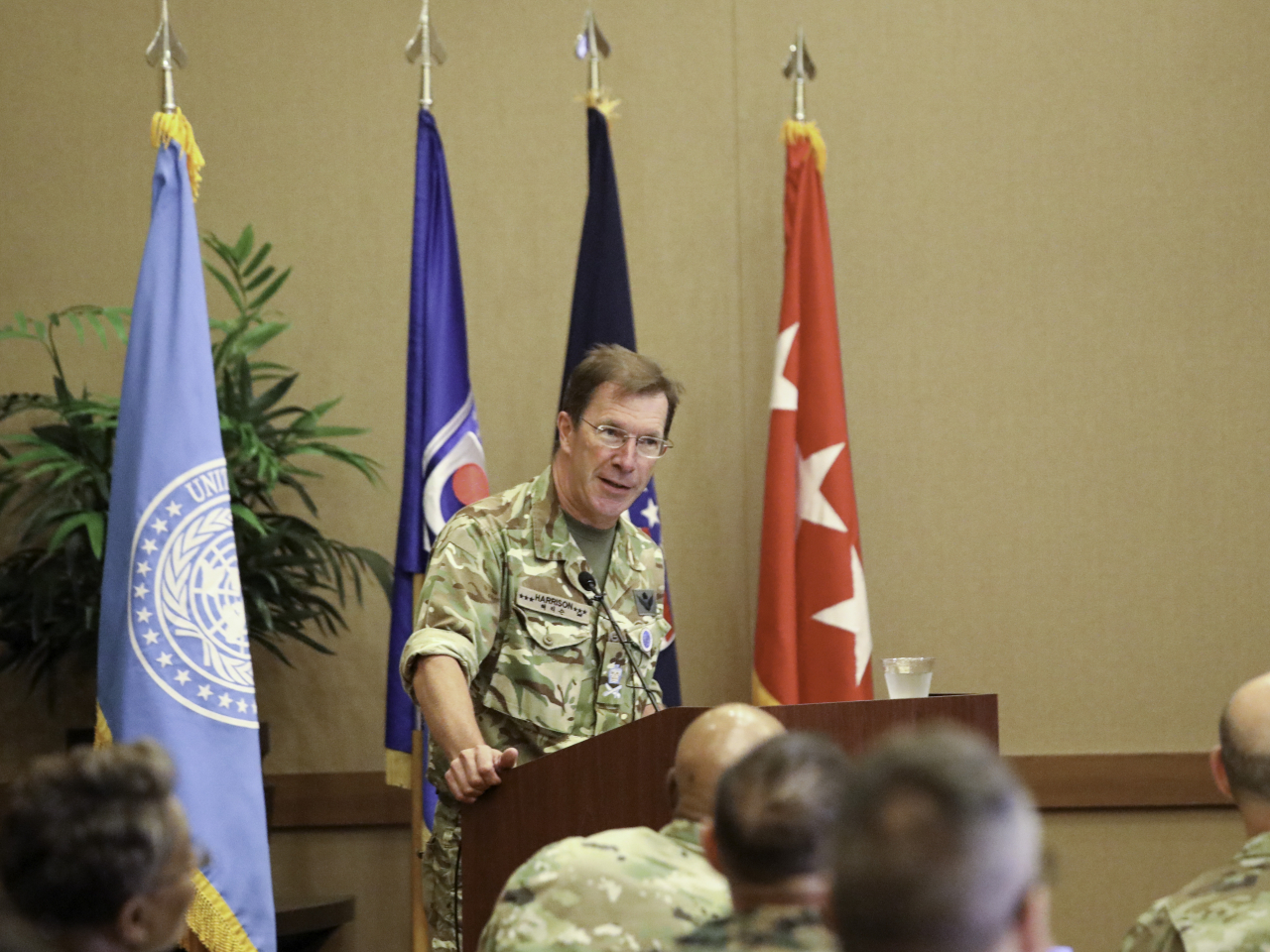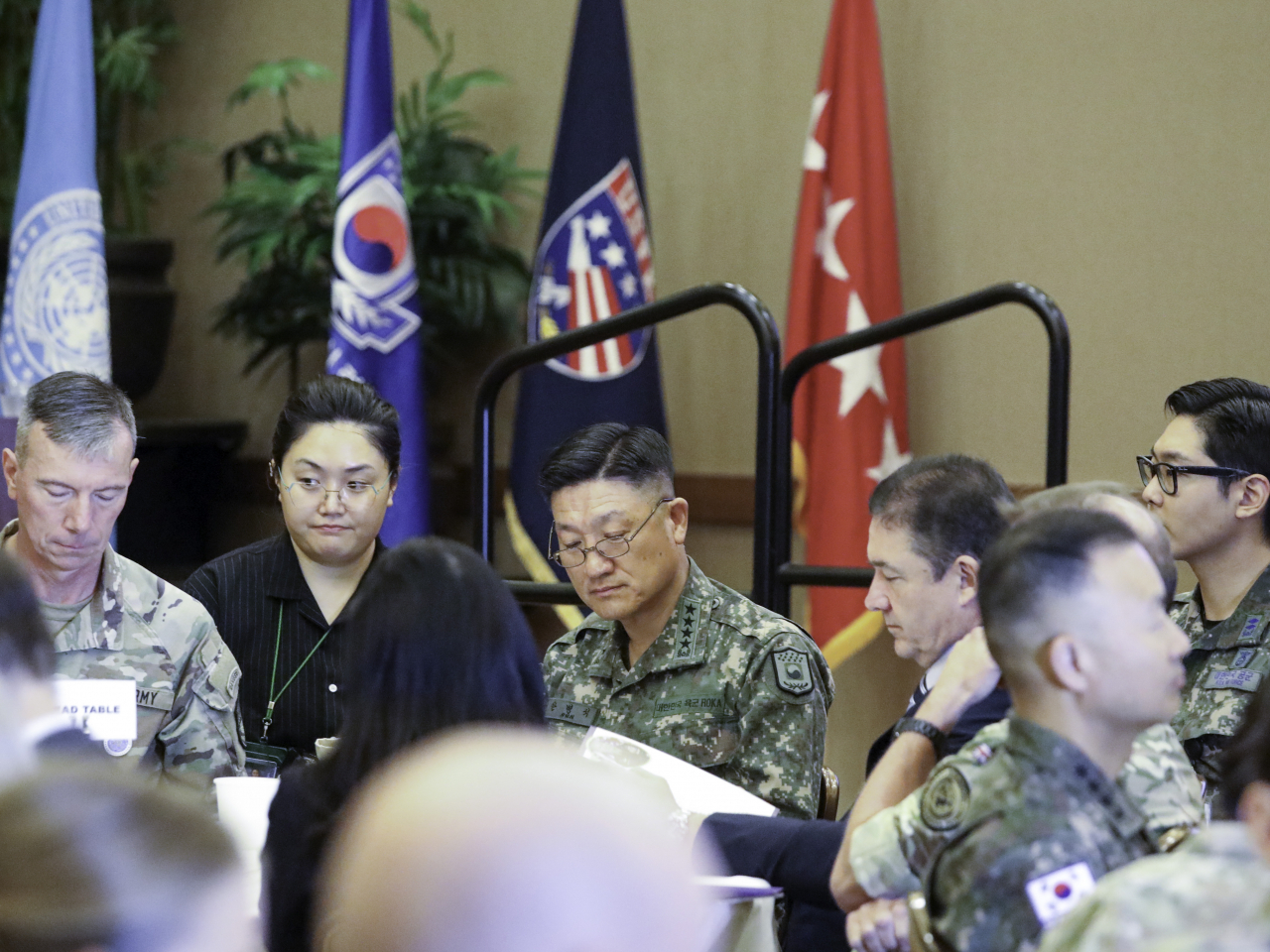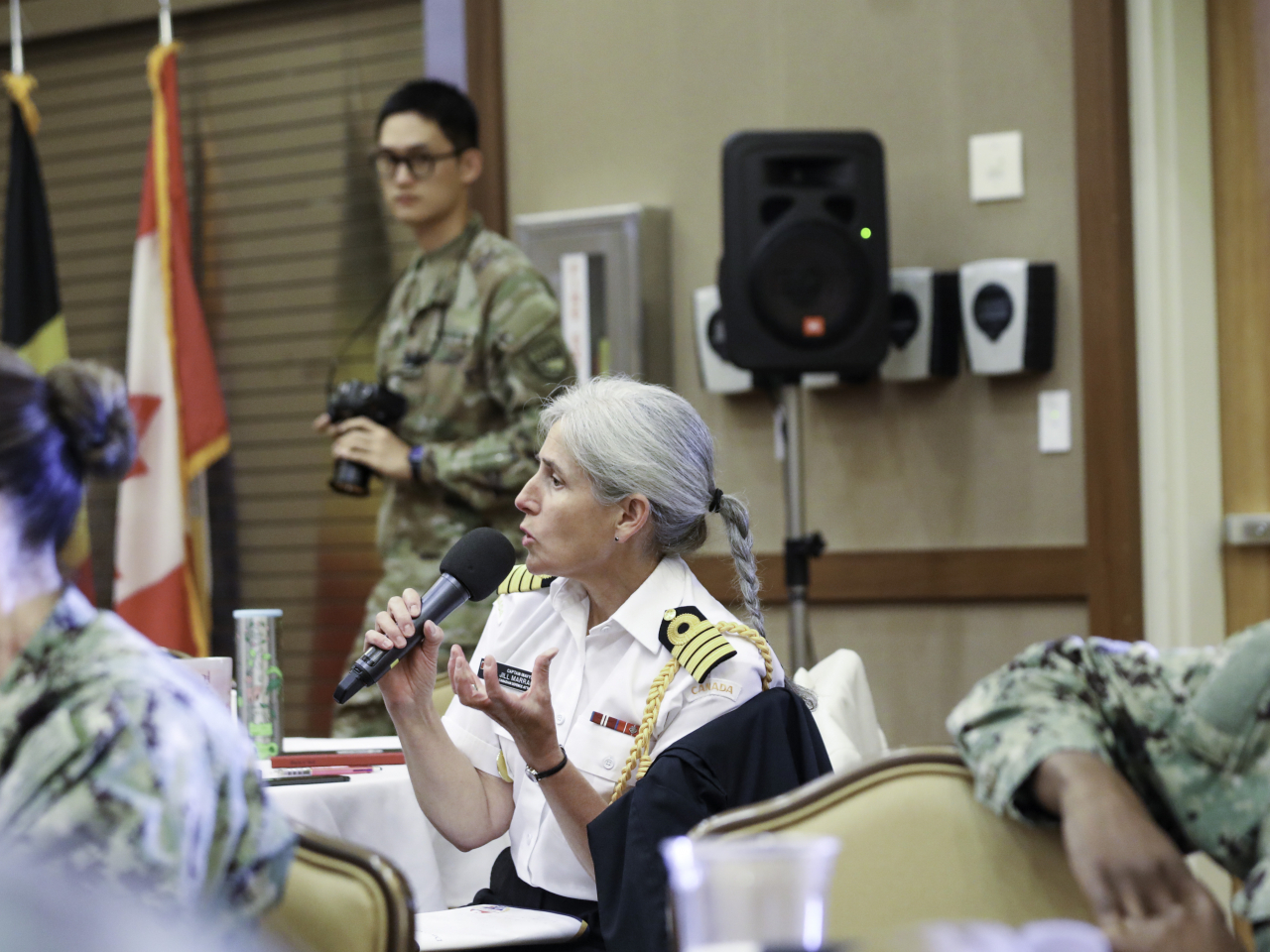[From the Scene] Empowering women as ‘force multiplier’
Symposium discusses role of women in military, future of alliance
By Ji Da-gyumPublished : June 13, 2023 - 17:49

CAMP HUMPHREYS, Gyeonggi Province — South Korean and US forces have come together to lay the ground for enhancing women's participation and expanding their role in maintaining peace and security on the Korean Peninsula and beyond.
The first-ever, three-day Women, Peace, and Security Symposium, jointly organized by the United States Forces Korea, United Nations Command, and Combined Forces Command, commenced on Tuesday at Camp Humphreys, the US' largest overseas military base, in Pyeongtaek, Gyeonggi Province.
The primary objective of the symposium is to initiate discussions and devise strategies aimed at seamlessly integrating women into the military, thereby transforming them into force multipliers. This comes during a critical period marked by mounting multifaceted internal and external challenges.
These challenges encompass volatile security situations across the Korean Peninsula and the wider Indo-Pacific region, as well as the military recruitment crisis faced by both allies.
Around 300 participants -- including senior and working-level military personnel, government officials and embassy staff of UNC sending states -- sat down for the discussion.

"This is our first, deep dive into these issues," British Lt. Gen. Andrew Harrison, the UNC deputy commander, said during the symposium. He emphasized the critical importance of integrating women into the military as a necessity to "secure the future of the alliance" and uphold peace and security on the Korean Peninsula.
"Incorporating diverse perspectives into our plans and our organizations makes us better equipped to confront our competitors. It makes us more likely to be able to defeat our adversaries. And of course in the end, they'll save lives," Lt. Gen. Harrison said.
"If you want to know the value of it, compare those factors that exist north of the border here ... to what's going on in the South."
William Wieninger, a professor at the Daniel K. Inouye Asia-Pacific Center for Security Studies, a US Defense Department institute, emphasized that women incorporated into the military can serve as a force multiplier that can dramatically increase the effectiveness of a given force on the battlefield.
"Obviously, it can be a force multiplier, by bringing in added human capital. Women represent 50 percent of our society's human capital and our fighting force. Our security forces will be far more effective if we leverage that," he said.
Wieninger pointed out the simple math behind operational effectiveness, explaining that if the US military solely recruits males, it would have access to only 43 million candidates, assuming that 25.8 percent of the population possesses above-average intelligence. But by recruiting both genders, the number of candidates increases to 86 million.
Similarly, South Korea faces a comparable situation. By including women in the recruitment pool, the country's available candidates nearly double from 6.5 million to almost 13 million.

"Since women make up such a large percentage of the population, it's important that all of their abilities are used throughout our military, whether that's as a nurse or a pilot or a logistician or an intelligence officer," US Air Force Maj. Sarabeth Moore said.
"Women can do all of those things equally as men, and if we recruit, train and advance women, we increase our military capacities. And by broadening our recruitment efforts and thinking more broadly about what women can bring to the table, we increase our capabilities both in the US, in the Republic of Korea and internationally."
Maj. Moore underscored that the goal of the symposium is to "ensure planners and leaders in the military are looking outside of their narrow lanes."
The inaugural symposium holds a significance as it marks the initial stride taken by the three commands headquartered in South Korea to implement UN Security Council Resolution 1325, adopted in October 2000. This resolution provides a policy framework for the Women, Peace, and Security, or WPS, agenda, emphasizing the importance of women's equitable participation and comprehensive engagement in all efforts to preserve and advance peace and security.
The symposium specifically aims to address the inclusion and empowerment of women in military decision-making processes, as well as planning, bilateral and multilateral operations. By doing so, the symposium seeks to enhance the overall readiness and effectiveness of the three commands in dealing with security challenges both on the Korean Peninsula and in the wider Indo-Pacific region.
“What we're trying to get out of it is to look at our operations, activities and investments from a gender perspective to have meaningful participation of females in the decision rooms, in the planning rooms in order to achieve and maintain peace and security here on the peninsula,” US Air Force Lt. Col. Charlynne McGinnis said.

Miemie Winn Byrd, a professor at the Asia Pacific Center for Security Studies and a retired Burmese American lieutenant colonel in the US Army, drew attention to the significant role of women in defending democracy in Myanmar against the military government.
Byrd emphasized that approximately 60 percent of the resistance forces in Myanmar consist of women , which is geopolitically important to China. She went on to say that women are fighting for democracy right at China's doorstep, while China has opted to support Myanmar's military government in its conflict against the popular resistance movement.
"If we're able to keep Myanmar under the column of democracy in the strategic competition of authoritarianism and democracy, we will go a long way. And to do that, the frontline soldiers today are women of Myanmar," she said.
Byrd highlighted that Myanmar can serve as an example of how we should effectively utilize women, considering they have been overlooked in terms of their potential to "make a difference against our opponent."
"I am sure our enemy is not looking at that half the population," she said. "In our region, they are at the tip of the spear to maintain democracy."




![[Weekender] How DDP emerged as an icon of Seoul](http://res.heraldm.com/phpwas/restmb_idxmake.php?idx=644&simg=/content/image/2024/04/25/20240425050915_0.jpg&u=)




![[Music in drama] An ode to childhood trauma](http://res.heraldm.com/phpwas/restmb_idxmake.php?idx=644&simg=/content/image/2024/04/25/20240425050929_0.jpg&u=)








![[Herald Interview] Mistakes turn into blessings in street performance, director says](http://res.heraldm.com/phpwas/restmb_idxmake.php?idx=652&simg=/content/image/2024/04/28/20240428050150_0.jpg&u=20240428174656)
